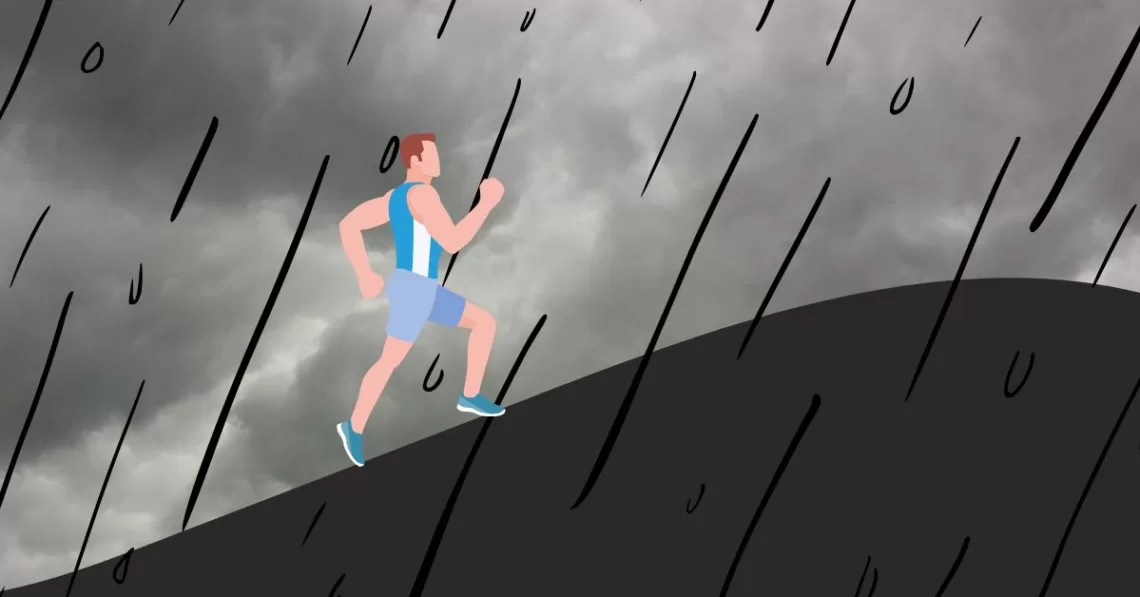
Why running in the rain boosts mental health
Running in the rain is the closest I think I will ever get to feeling like a woman in a 1990s Tampax advert.
There is something joyously liberating about running through a torrential downpour and tonight, as I set off for a 10km trot with my running club, it absolutely chucked it down.
Completely drenched within seconds, I splashed though puddles, jumped over treacherous manhole covers and generally felt a little like I was in an action movie chase scene. It was fantastic.
We ran past normal people, hurrying to escape the rain, cowering in shelters or dressed in enormous coats and battling their umbrellas. Of course, if we weren’t running, we would be like the normals – desperately trying to stay dry. But we were running, and thoroughly enjoying being abnormal.
Mental health link
I have run for most of my adult life and I have written at length in the past about the mental health benefits of running.
Having been diagnosed with prostate cancer aged 40, it was running that got me through the diagnosis, treatment and recovery. Indeed, so grateful was I to it, that I wrote a book about the link between positive mental health and running (The Running Drug, Clued Up Books), to raise funds for Prostate Cancer UK.
Running in the rain delivers an endorphin boost that can lift the darkest of moods and I’d recommend it to anyone. However, I understand how difficult it can be for people to consider it, especially if they’re struggling with poor mental health.
When you can’t see the light and you’re sinking into negative thoughts, finding the energy and motivation to get your kit on and get outside is incredibly hard. Doing so when it’s raining is even harder.
However, if you accept that the hardest part of any run is getting out of the front door, and that once you’re wet through, you can’t get any wetter – I promise you it’ll be worth it.
I have always found that running clears my head, literally allowing me to run off the things that I’ve been worrying about. Doing it in the rain, meanwhile, is like throwing a cold shower into the mix. It rejuvenates and refreshes, metaphorically washing away the things that have been weighing heavy on your mind, and allowing you to reset and start again.
Five core reasons to run in the rain
Over the years there have been countless studies looking into the benefits of running and of spending time outdoors, even in the rain, most of which essentially boil down to the following five core benefits:
- Stress Relief: Running in the rain can be a calming and soothing experience. The sound of the raindrops hitting the ground and the smell of the fresh rain can help to reduce stress levels and promote relaxation. The smell of summer rain on hot concrete is a personal favourite of mine.
- Mood Booster: Running in the rain can help to boost your mood and improve your overall sense of wellbeing. This is because exercise releases endorphins, which are the body’s natural mood-boosters.
- Mindfulness: Running in the rain can help you to be more present in the moment and to practice mindfulness. Granted, this may be easier when you’re walking rather than running, but you may still find yourself paying closer attention to your surroundings and the sensations in your body, two core elements of mindfulness.
- Resilience Building: Running in the rain can also help to build resilience and mental toughness. It can be challenging to push through the discomfort of being wet and cold, but doing so can help to increase your confidence and sense of accomplishment.
- Connection with Nature: Running in the rain can also provide a connection with nature and the environment around you. This can help to promote feelings of calmness and connectedness, which can have a positive impact on mental health. When everyone else has run indoors and it’s just you and the flora and fauna around you, this can feel really special.
Fun factor

Thankfully, running in the rain is also great fun and requires nothing more than your normal running kit. Expensive running jackets are designed to protect runners from the elements but, despite owning a couple myself, I prefer to leave them at home and just head out in shorts and t-shirt. Opting for lightweight wicking fabrics, is a good idea however, as anything made of cotton will become 10 times heavier the moment it gets wet.
I’d also choose a route that’s quiet in terms of traffic because, although a rainy run is liberating, being drenched by a passing bus isn’t. Stopping to hurl a sarcastic ‘thank you mate’ at the passing driver, wont help you with your mindfulness.
Forget your pace
Unsurprisingly, studies have also found that running in the rain does not improve your physical performance. Indeed, while the studies quoted here carried out all kinds of tests to prove the point – including, for some reason, a close look at runners’ rectal temperature – common sense dictates that no runner is going to run at their fastest when trying to cover ground that is exponentially more slippery than normal.
For those of us without a death wish, slowing down is the sensible approach when it rains, as are other common sense practices like watching out for slippery surfaces, being cautious over unknown puddle depths and not sheltering under a tree if freaked out by lightning.
However, when you’re running through a storm and rain is lashing down, your time really is irrelevant. Take your time instead and enjoy the experience. Indeed, in terms of building resilience, a slow 30-minute run in the rain might actually be better for you than a 30-minute fast run in the dry.
Take the family with you
This evening, my 12-year-old son joined me at the running club as he trains with the junior section, while I run with the far more injury prone seniors. Picking him up at the end of the evening, he was buzzing, having spent the session running circuits in the rain with his friends. He was experiencing the same adrenaline high that I was and we both went home feeling great.
I’ve taken my children out running in the rain on several occasions in the past. Each time, initial reluctance and cries of; “are you mental dad?,” are quickly replaced with smiling faces and a sense of disbelief at how soaked we all are.
Like I am allowing them to do something that’s usually prohibited, there is a conspiratorial bond that unites us after a run in the rain, especially when we return home looking like we’ve been swimming in our clothes.
Go wild
A run on the wild side is also a great way to bank some extra endorphins. There have been countless studies and articles written about the health benefits of being active outdoors, and trail running is the perfect way to combine both.
I am lucky to live in an area of the UK with hundreds of miles of trails on my doorstep, allowing me to escape the pavements and quite literally get lost in nature. I have my favourite routes and many of them take me to places without a single other person or dog walker. Just me, the occasional deer, fresh air and bird song. It’s truly wonderful and lifts my spirits every time I’m out there, even more so when it happens to be raining at the same time.
Of course, if you are heading off the beaten track, it’s vital to let someone know where you’re going before you set off and what time you expect to be home. Runners do come to harm on occasion but, as I’ve found, the far more likely scenario is that your in-built sat nav is off and you end up miles away from where you think you are – turning a 5K quick run into a half marathon.
Be consistent
As with anything in life, once is never enough. Running in the rain is a glorious experience, but to feel the long term benefits to your mental health, you need to be running regularly.

Your wet runs should combine with your dry runs, cold runs, hot runs, windy runs and I-really-don’t-want-to-today runs, to give you a consistent crutch that you can lean on when you need it.
Allowing running to become a habit can be life changing. The benefits to your physical health are obvious – improved cardiovascular health, weight loss, strength and stamina – but the benefits to your mental wellbeing can be just as significant.
For anyone facing personal adversity of any kind, be it cancer, depression or anxiety – and even if you’ve never run a step in your life – start slow, perhaps with a couch to 5K programme, and build up, but keep it consistent.
The regularity of putting your kit on and getting out the door will bring with it a mental health boost that no prescription drug can provide. Indeed, there’s a reason why doctors prescribe exercise for depression, it works, and the NHS has excellent advice for anyone wanting to know more about the benefits of being active.
So, the next time it starts to rain and you’re feeling like the weight of the world is on your shoulders, leave your 1990s rollerblades at home, reach for your trainers and enjoy your own Tampax ad experience.
Read more about running and mental health…

I wrote The Running Drug after being diagnosed and successfully treated for cancer in 2017. It tells the story of that time and how training for and running the London Marathon helped me through it.
“Tim Beynon found himself in a situation nobody would want, and he ran and wrote his way out of it with searing honesty and a self deprecating wit. It’s a practical, morbidly fascinating and inspiring read. It made me want to get myself checked out.”
Paul Tonkinson, Runner’s World columnist and comedian




